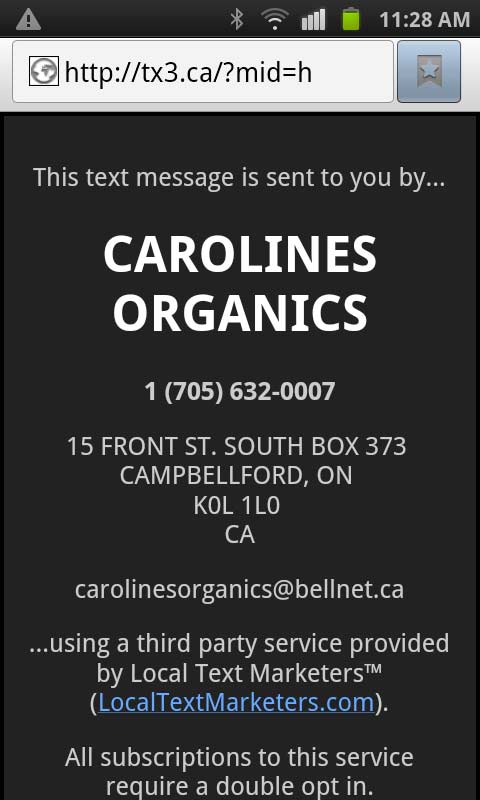SMS Marketing Laws: Canada & US
Table of Contents
These laws will vary according the country in which you operate. Local Text Marketers provides mass texting services in both Canada and the U.S., so we’ll talk primarily about the laws in these two countries…
Note: I’m not a lawyer, and I don’t play one on T.V. What I present here should not be considered as legal advice, but a “primer” on the applicable laws. You should always check with your own attorney about your local laws. Cool?
U.S. SMS Marketing Laws: Telephone Consumer Protection Act (TCPA)
In the U.S. the rules for the sending of bulk SMS messages are laid out in the TCPA, since text messages are considered to be in the same “ball bark” as telephone numbers sent by auto dialers, which was the primary focus of the original law.
Not surprisingly, the law hinges on consent.
In other words, you need to have your customer’s express permission to send SMS / text messages to their phones and mobile devices. “Express” means “written” consent. Written may be physical (i.e., actual signing a physical document), or it can be provided digitally as well.
What Should Express Consent Look Like?
Here’s what our lawyer provided us as a template for our U.S. customers to use. As ever, please consult your own attorney and do your own due dilligence before adopting our template into your own promotional strategies.

Be Very Careful…
Here’s where some business owners get into trouble…
They assume that a previous/existing business relationship provides all the permission they need to add their clients to an SMS marketing list.
They’re wrong. In 2013, the TCPA eliminated this exemption.
Now, if you’d like to upload cell phone numbers from an existing customer database into an SMS gateway service for mass texting, you’re going to have express permission from each and every person first.
I’m not kidding. Otherwise, you assume huge legal liabilities; fines run as high as $500-$1500 per unauthorized text.
Plus, there’s the risk of civil suits as well; because of the intimate connections people have with their cell phones and mobile devices, they are much more sensitive as to what they perceive as spam on them, and accordingly, tend to get very annoyed by unauthorized messages very quickly.
A Reasonable Workaround
Obviously, there are a huge number of logistical headaches involved with obtaining express permission from each and every person on your current client database.
A much simpler solution is to connect with your customers using the means for which you have permission to do so (i.e., email, social media, etc), and ask them to subscribe from their own handsets. This is called a “handset initiated opt-in”, and since it originates from your customer and optimally uses a double opt-in process, is all the permission you need.
However…
You will need to provide a compelling reason for them to do so, and for best results, offer a powerful incentive in the form of an…
- Exclusive offer
- Freebie
- Coupon
- Discount
The right incentive will make all the difference in the world to the success of your program and the percentage of people who take you up on your offer, so take your time coming up with the right one.
I highly recommend giving a little more than you normally would; consider the long term value each customer brings to your business, your traditional advertising costs, and then, the value of being able to deliver your marketing messages directly into your customers’ hands…
… Knowing 95–99% of your messages will be seen and acknowledged in under 3 minutes.
Need some help brainstorming the perfect incentive? I’d be happy to help. Book a call with me using the form here!
Canada’s SMS Marketing Laws: Canada’s Anti Spam Legislation (CASL)
In Canada, SMS marketing falls under Canada’s Anti Spam Legislation or CASL (pronounced “castle”).
CASL went into effect on July 1, 2014. It governs the rules that apply to the sending of all commercial electronic messages (i.e., email, SMS and some social media messages). The law was phased in over 3 years, allowing businesses some time to ensure they were operating under full compliance.
In some ways, CASL is more forgiving than the U.S. law, because it does allow business owners to connect with customers with whom they have prior existing relationships.
On the other hand, it’s a logistical nightmare, because that consent can “expire.”
Let me explain…
Implied Vs. Express Consent
Canadian spam laws also hinge on consent, but CASL has two variations, “implied” and “express.”
Implied Consent
If I conduct a business transaction with you, you have my “implied” consent to contact me. This consent lasts for…
- Three years, if the transaction occurred prior to the implementation of the law (July 1, 2014)
- Two years, if it occurred after.
If I should conduct another transaction with your business within that period, the clock is essentially “reset”, adding an additional 2 years to the period that you may legally contact me. If I do not, your communications become illegal either 2 or 3 years from the date of our last transaction, depending on when that transaction occurred (see above).
Confused yet?
Essentially, “implied” consent is a logistical nightmare, and the only way to really get around it is to obtain your customer’s “express” consent…
Express Consent
Obtaining “express consent” requires that you obtain your customer’s express permission to contact them.
This permission may be given by physically or electronically signing a document.
It can even be given orally, but oral permission requires detailed documentation to support it; should you ever be challenged on it, the burden of proof falls on you to demonstrate you’re in compliance.
In other words, you’ll need to produce a document that notes the time, place, date, and circumstance that lead to said oral permission.
For instance…
“Thursday, August 20th, 7:30 PM. Chamber of Commerce Business Card Mingle. Ramada Inn, Belleville Ontario. Was introduced to Tom Jones by COC president. Chatted about upcoming Charity event. Obtained his permission to connect about our SMS solution. Exchanged business cards.”
In the case of SMS marketing, there’s an easier way to obtain “express” consent; require that your customers “opt in” on their mobile devices and confirm their subscriptions to continue receiving marketing messages from you.
As noted earlier in this article, the key to enticing customers to subscribe hinges on a compelling reason to do so, and a powerful incentive.
Other CASL Requirements
CASL requires that *any* electronic message (which includes texts/SMS) with a commercial intent include…
- A one step unsubscribe or opt out option (i.e., the ability to unsubscribe at any time with one click or action).
- Information that identifies the sender, discloses a physical postal address and provides one additional way to contact the sender
Given that text messages are short (136 characters on a short code, 160 on a long code), it’s not possible to include all this information in a text message, so it has to be made accessible via a web link appended to the message.
Most of the big box stores using SMS in Canada are not including this link, and accordingly, are in violation of CASL.
How We Deal with Canadian SMS Marketing Laws
Easy.
First of all, any message sent from our system is appended with the required “reply STOP to cancel.”
We also include a shortened web link for Canadian users (to reduce character requirements to as little as possible).
Clicking this link brings the subscriber to a mobile responsive web page that identifies the sender, and provides the necessary contact data as required by CASL. Here’s what it looks like…

There is no way to remove these links from a mailing.
We also provide plenty of help information here, too, to enhance your customers’ experience.
Imported contacts are “invited” to join your service, and most proceed through a double opt-in process to confirm their subscription. Once completed, they have provided “express” consent, and your CASL headaches are over.
SMS Marketing Laws: Conclusion
Connecting to your customer’s phones—where they are most engaged—with a simple, comfortable technology like SMS, offers incredible opportunities to your business.
Opportunities to differentiate yourself from your competitors, build better relationships with your customers, increase sales, earn more word of mouth referrals, and boost customer retention.
But, if you don’t do your homework and are 100% legal, your business may assume huge financial liabilities. As discussed, fines from regulatory bodies are outrageously steep. And then, of course, there is always the dangers posed by civil suits launched by irritated customers.
Don’t risk your business.
Be compliant. Do compliance. Partner with a company that IS compliant.

